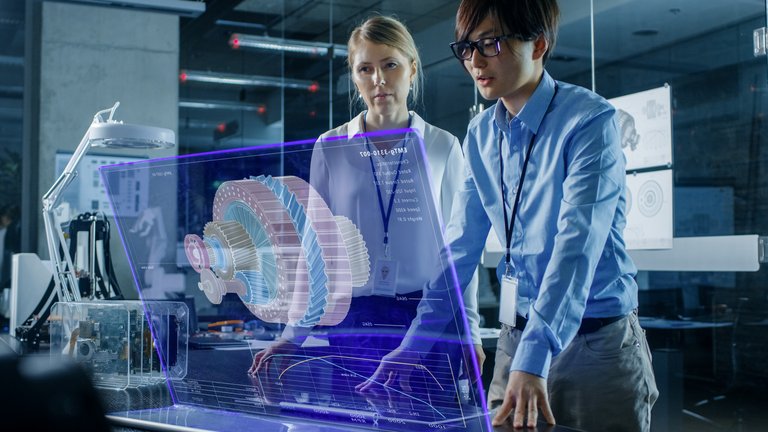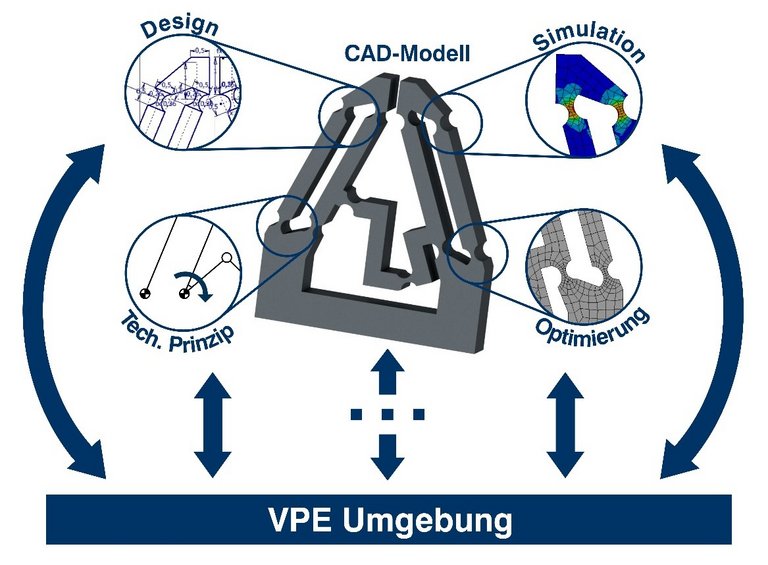Together with Nordhausen University of Applied Sciences, TU Ilmenau is developing a hybrid learning environment for training students in a key industrial field: virtual product development. In the future, all Thuringian universities are to benefit from the results of the project, which is being funded as a pilot project.

As the term implies, product development means the development of products from the requirements to production and usage readiness. For the goods of all industries, whether automotive industry, clothing industry, construction sector or electrical and electronic devices and equipment, the required products must first be developed. In doing so, they must meet today's highly complex requirements and demand a correspondingly demanding development process.
Interdisciplinary integration and increasing digitalization
Modern industrial product development is characterized by an interdisciplinary interlocking of various specialist disciplines, from product development and design to quality assurance and production planning, accompanied by increasing digitalization. The decisive cornerstone for innovative, competitive and holistic product specification are modern 3D CAD systems for the design of virtual three-dimensional product models and their linking with diverse software tools, task-specific user interfaces and data systems for the management of, for example, releases or versions of the design models created. In this way, a complete and continuous virtual product development is realized beyond the boundaries of the company.
Important building block of a practice-oriented engineering course
Just as Virtual Product Development (VPE) is a key industrial field, the subject of the same name is also an important component of practice-oriented engineering studies and is reflected in the curricula of various technical disciplines such as electrical engineering, mechanical engineering and computer science and their combinations. At the same time, modern development also constantly requires new teaching and learning formats as well as associated environments for academic training. Particularly in the technical disciplines, universities are required to develop and use modern teaching and learning methods that enable object-oriented, i.e. practical work on concrete applications, and teaching and learning that is best adapted to the learning progress of the individual students.
Trend towards hybrid forms of teaching and learning
The trend is increasingly moving away from traditional face-to-face teaching, in which the lecturer gives a lecture in front of the students in plenary session, towards a combination of digital teaching materials for self-study, online learning and in-depth face-to-face teaching that meets the needs of the students, in short: hybrid forms of teaching and learning. With the pilot project "Establishing a Hybrid Teaching and Learning Environment for Virtual Product Development", the scientists at TU Ilmenau led by Prof. Stephan Husung, Head of the Department of Product and System Development, and their partners at Nordhausen University of Applied Sciences led by Prof. Folker Flüggen from the Department of Mechanical Engineering, Design and Manufacturing Technology want to meet today's new requirements for targeted training in the field of VPE.

Extended teaching formats for greater learning progress
The new learning environment developed by the partners is to include coordinated, modularly structured and didactically prepared multimedia material for project-based learning, as well as opportunities for the students themselves to constantly check the skills they have acquired. The aim is to use the actual classroom sessions more for discussions, concrete applications using examples or clarification of open questions. The classical reading aloud then does not take place or only to a very limited extent. For this, the students must have already worked through the materials provided on the basis of established 3D CAD systems, such as videos, simulations of product models and interactive animations, in self-study before the event and have carried out self-evaluations on their learning progress. The figure shows the basic concept of end-to-end Virtual Product Development with models that increase in maturity over development and are reused for different tasks, such as simulation. This teaching method, which involves hybrid teaching and learning formats with an extension of traditional activities both inside and outside the lecture hall, has now become established as a modern training concept under the name "inverted classroom". "Important to the concept is the need-based alternation between self-study, work in student groups and consultations with lecturers," explains Prof. Husung. "Added value results above all in the learning progress, since during the semester the competencies of the students are built up in a targeted manner according to their needs. This happens through the active involvement and stimulation of students through targeted questions and technical discussions and, in the context of engineering, especially in the opportunity to discuss more about practical applications."
Funding via Thuringian network
The pilot project is funded for one year with personnel and material resources by the eTeach network Thuringia. The eTeach network promotes innovative impulse projects that digitally enrich and further think teaching and learning at Thuringian universities. This also involves the implementation of innovative digital tools that contribute to the didactic enrichment of teaching and learning in the real and the virtual. After successful completion of the project, the new learning environment will initially be implemented in Ilmenau and Nordhausen for the Bachelor's and Master's degree courses in mechanical engineering. At the same time, the pilot project represents the starting point for the adaptation to other courses of study and universities in order to enrich the teaching and learning offer with modern forms here as well.
Contact
Prof. Stephan Husung
Leiter Fachgebiet Produkt- und Systementwicklung

